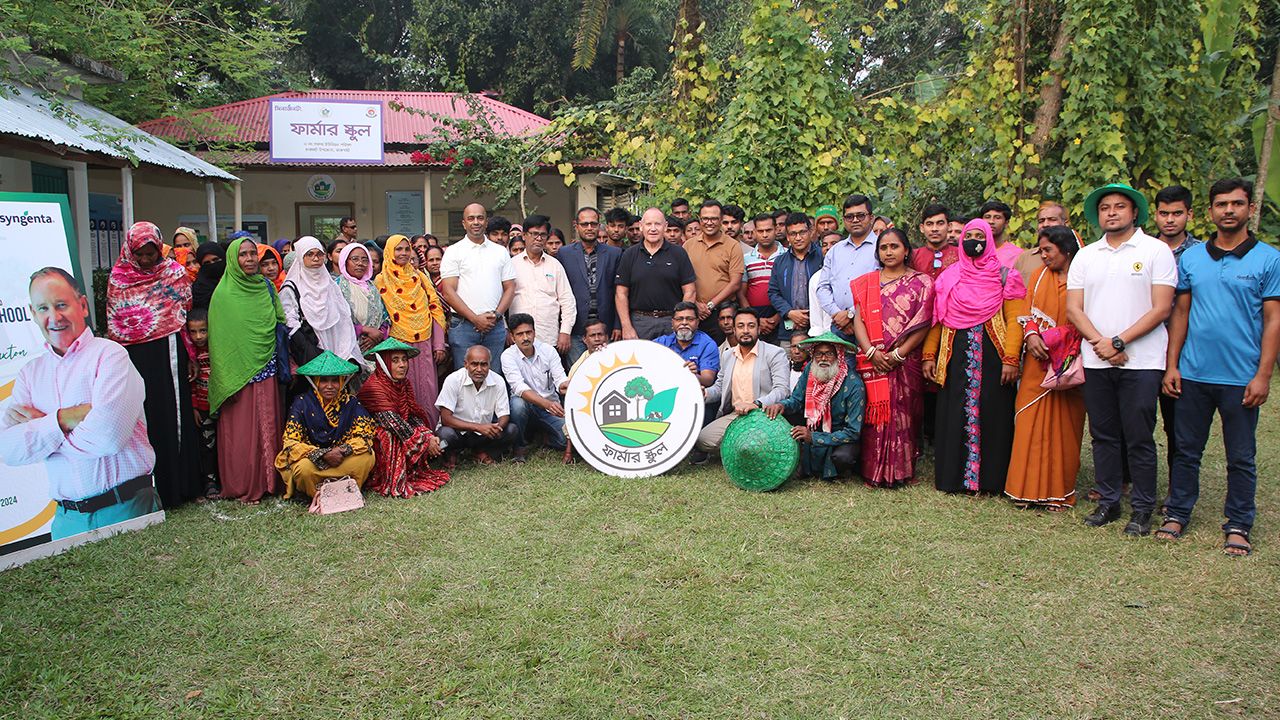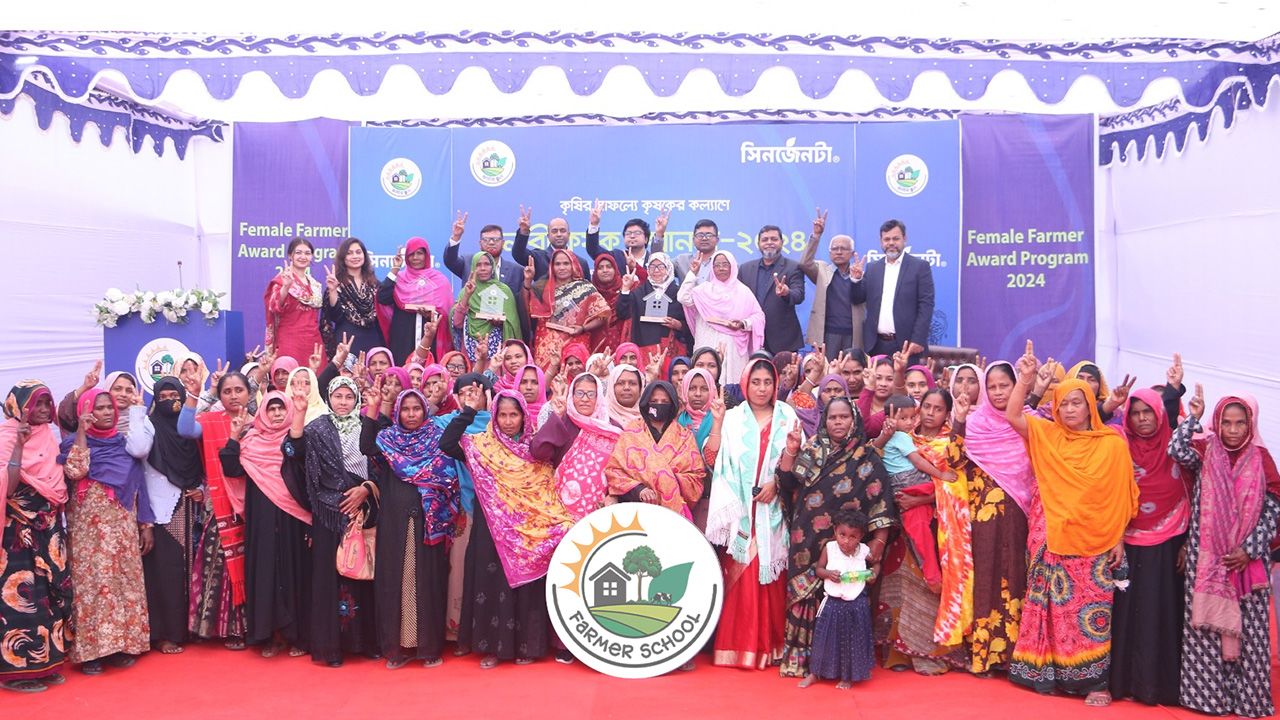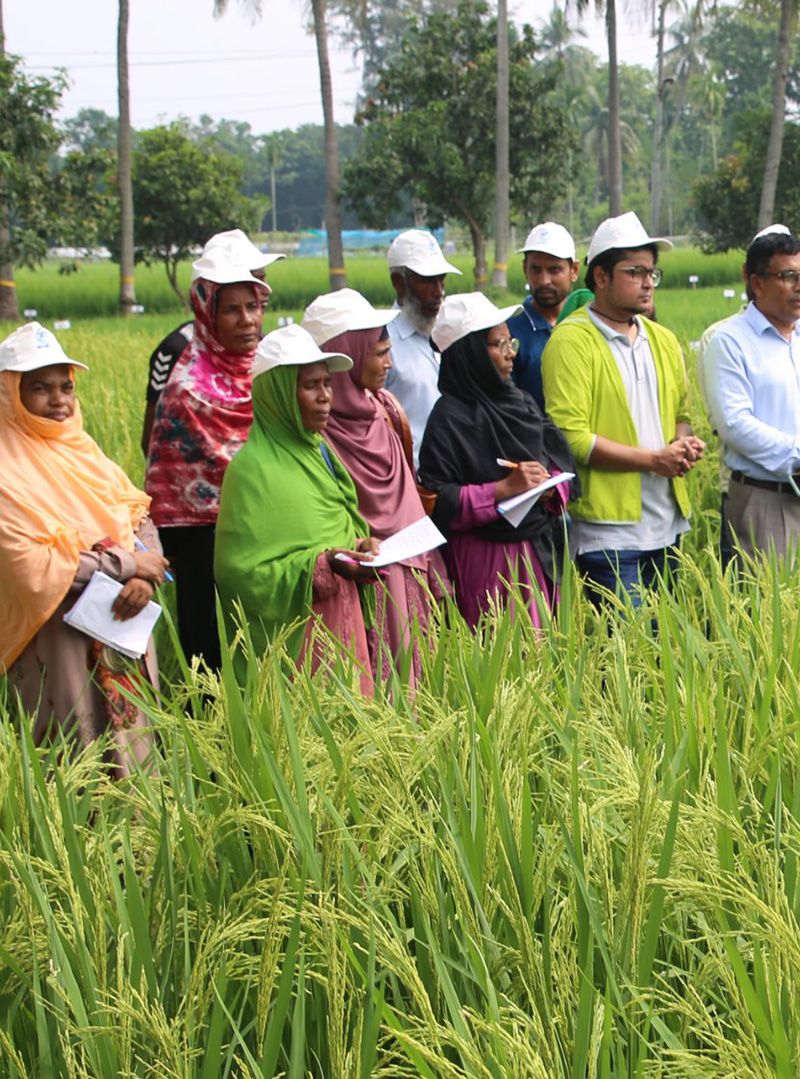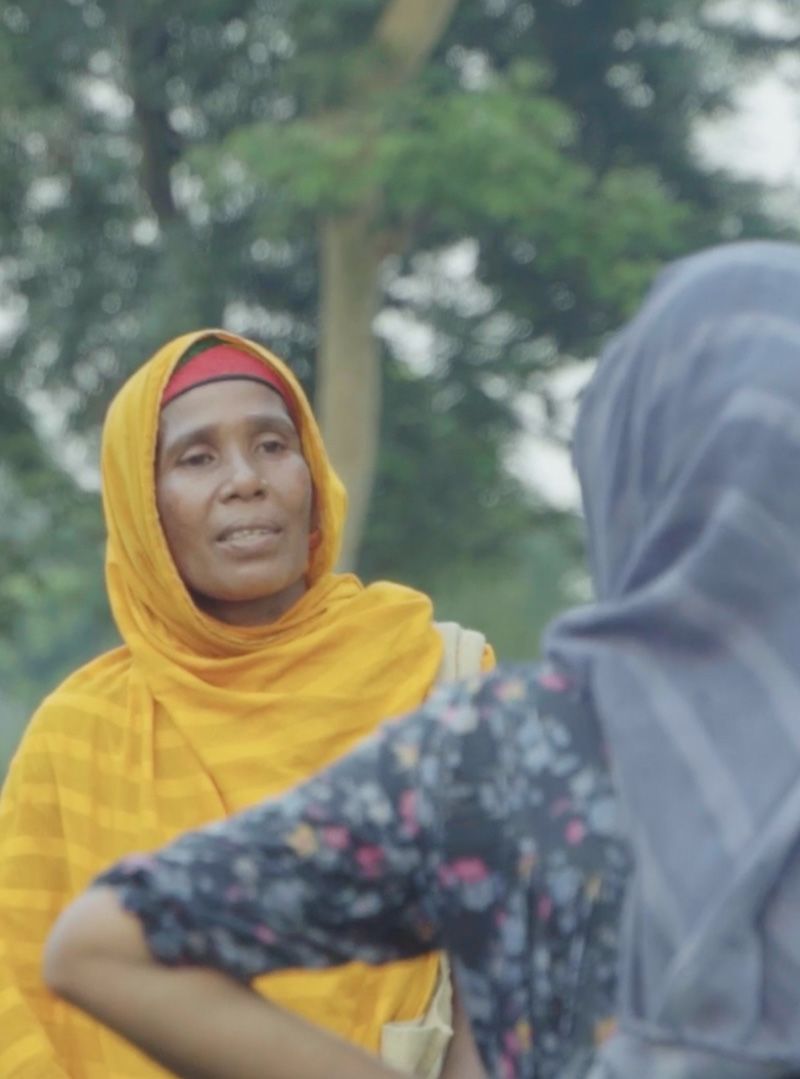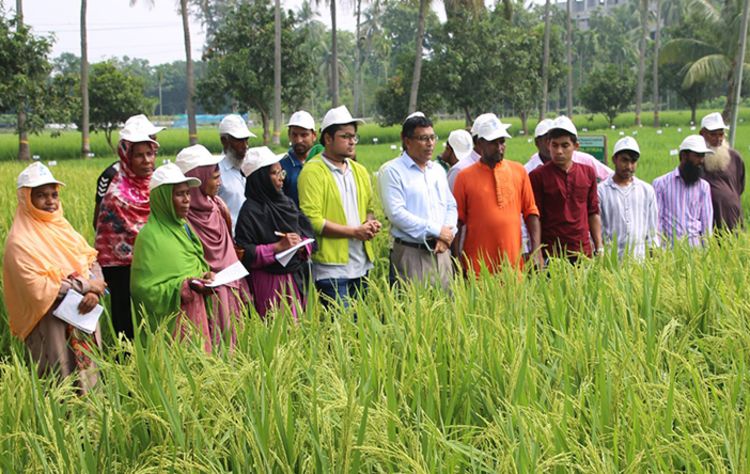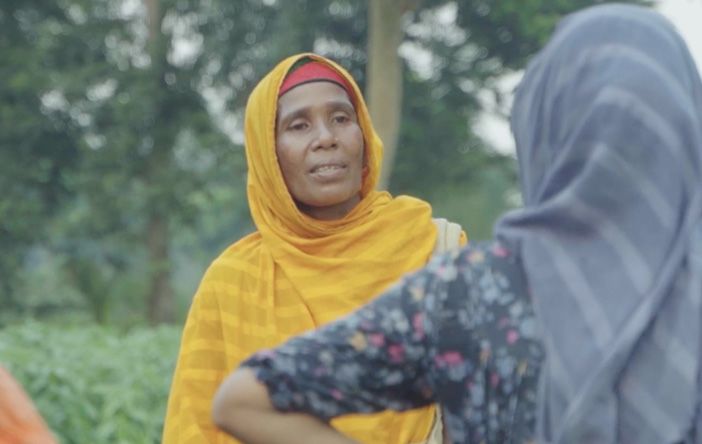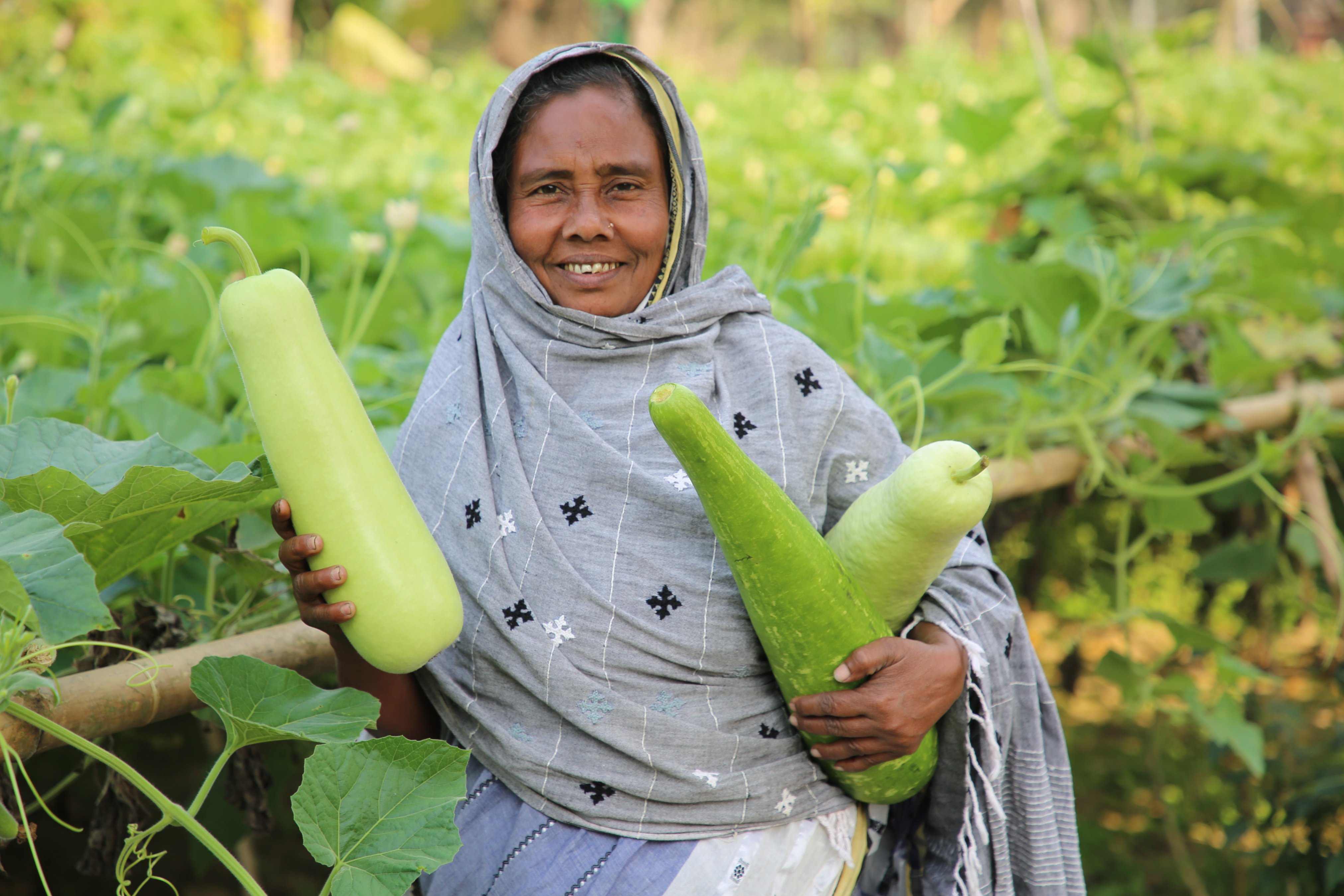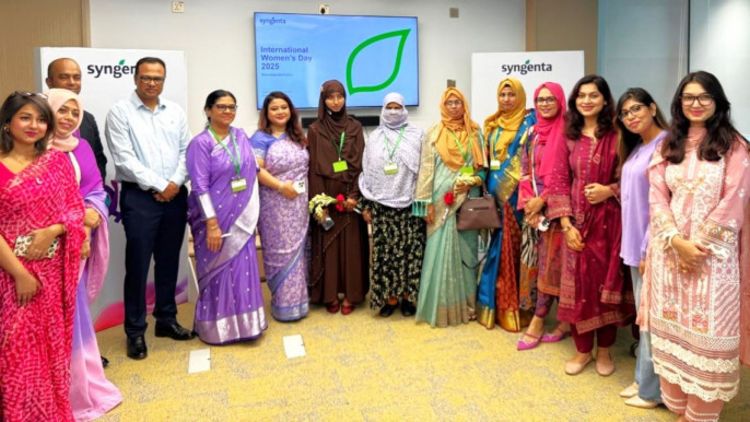A farming future shining with possibilities
How Syngenta is empowering women farmers in Bangladesh

Syngenta is helping bring new skills and knowledge to female smallholders across Bangladesh - and seeing lives transformed because of it.


For Sulekha Khatun, farming started not as a career, but as a means of survival.
“When I got married, I was pursuing my studies,” Khatun says. “My husband lacked stable income, causing financial worries. Everyone in the family perceived me as a burden.”
To help support her family, Khatun began farming a small patch of land behind her house. But hampered by a lack of knowledge and financial support, as well as wider social resistance to women in farming, Khatun found herself facing many challenges.
Her story is far from unique. Of the 16.5 million farming families across her country of Bangladesh, around 85 percent are smallholders, working two acres of land or less, cultivating crops such as rice, wheat, cotton, corn, vegetables and mangos. This means that smallholders like Khatun are not just feeding their families, they are the backbone of Bangladesh’s agriculture economy.
Learn more about Sulekha's journey from mother, devoted wife, to now proud farmer.
Millions of farmers deal with a range of difficulties including access to finance, lack of training and agronomic education as well as adverse weather conditions like droughts and flooding.
Transformative education

To help smallholders meet these challenges, Syngenta Bangladesh helped to develop the Syngenta Farmer School, launched in January 2023.
This farmer training hub runs in the rural north of the country – an area with many smallholders facing persistent poverty as well as the region’s changeable weather.
As a collaboration supported by different government research institutes, Department of Agricultural Extension and non-government organizations, as well as the national and regional governments, the school addresses critical gaps in modern agricultural knowledge.
By providing practical training on issues such as crop stewardship and soil health, modern agriculture, mechanization, access to finance, livestock, fisheries and boutiques, the Farmer School empowers smallholders to build resilient and sustainable farming systems.
Farmer School participants celebrating the Female Farmer Award Program 2024.
Farmer School participants celebrating the Female Farmer Award Program 2024.
In just over two years, around 1,500 smallholders have gone through the school’s hands-on training program, a tangible example of Syngenta's commitment to improving rural prosperity.
Of the farmers trained, approximately 25-30 percent are women.
This indicates a promising shift toward the development of a more inclusive agriculture across Bangladesh.

Khatun says: “At the Farmer School I learned about crop nutrition, cultivation practices, pest management and fertiliser application techniques.”
The Farmer School also helps farmers gain access to vital financing tools. As a result, Khatun’s yields have increased, her efficiencies have improved, and her operation has expanded. Today, she farms five acres of land and seven new mango orchards. All of this has had a transformative impact on her social and economic security.
In recognition of her achievements, Khatun received the most prestigious Joyeeta Award from the Bangladesh Government. This accolade recognizes women who have achieved remarkable success, and made significant contributions to women's empowerment.
Khatun remains engaged with the Syngenta Farmer School, encouraging other women from her community to join.
As well as changing the lives of individual smallholders, the Syngenta Farmer School is a real-world example of the wider positive changes this kind of empowerment can bring to families and whole communities.
Mohammed Shahidul Islam, Head of Corporate Affairs and Sustainability Syngenta Bangladesh, explains: “Our Farmer Schools go beyond traditional training. It represents a revolutionary approach to empower farmers with modern knowledge, drive sustainable farming practices and supports our mission of improving rural prosperity with higher yields and lower impacts. This initiative marks a new chapter in developing the total ecosystems for the smallholder farming communities.”
The Farmer School helps equip smallholders with new knowledge through site visits.
The Farmer School helps equip smallholders with new knowledge through site visits.
For Sulekha Khatun, farming has become a source of pride and economic empowerment.
For Sulekha Khatun, farming has become a source of pride and economic empowerment.
Khatun says: “At the Farmer School, I learned crop nutrition, cultivation practices, pest management and fertiliser application techniques.”
The Farmer School also helps farmers to gain access to vital financing tools. As a result, Khatun’s yields have increased, her efficiencies have improved, and her operation has expanded. Today, she farms five acres of land and seven new mango orchards. All of this has had a transformative impact on her social and economic security.
In recognition of her achievements, Khatun received the most prestigious Joyeeta Award from the Bangladesh Government. This accolade recognizes women who have achieved remarkable success, and made significant contributions to women's empowerment.
Khatun remains engaged with the Syngenta Farmer School, encouraging other women from her community to join.
As well as changing the lives of individual smallholders, the Syngenta Farmer School is a real-world example of the wider positive changes this kind of empowerment can bring to families and whole communities.
Mohammed Shahidul Islam, Head of Corporate Affairs and Sustainability Syngenta Bangladesh, explains: “Our Farmer Schools go beyond traditional training. It represents a revolutionary approach to empower farmers with modern knowledge, drive sustainable farming practices and supports our mission of improving rural prosperity with higher yields and lower impacts. This initiative marks a new chapter in developing the total ecosystems for the smallholder farming communities.”
The Farmer School helps equip smallholders with new knowledge through site visits.
The Farmer School helps equip smallholders with new knowledge through site visits.
For Sulekha Khatun, farming has become a source of pride and economic empowerment.
For Sulekha Khatun, farming has become a source of pride and economic empowerment.
From Farmer School to the SheShines Project
As the Syngenta Farmer School scales up to more locations across the country, Syngenta Bangladesh has launched a new sustainability initiative to further empower women like Khatun. This is called the SheShines Project.
Like the Syngenta Farmer School, it is a training and resourcing program. Its aim is to develop skills, knowledge and provide access to financial support, but targeted specifically to women across the country, working throughout the agricultural value chain.
The SheShines Project is a training and resourcing program for women across Bangladesh working throughout the agricultural value chain.
The SheShines Project is a training and resourcing program for women across Bangladesh working throughout the agricultural value chain.
Women like Khatun are central to Bangladesh’s rural economy. But, just as she experienced, they often lack access to resources and opportunities to develop their businesses.
“I believe that women's economic empowerment is crucial for their recognition in the society,” Khatun says.
Hedayet Ullah (in white) and women smallholders celebrate the launch of the SheShines Project at the Syngenta Bangladesh head office.
Hedayet Ullah (in white) and women smallholders celebrate the launch of the SheShines Project at the Syngenta Bangladesh head office.
Through SheShines, Syngenta works to boost economic empowerment by equipping rural women with the knowledge, tools, and financial access needed to help them build thriving businesses.
Hedayet Ullah, Managing Director of Syngenta Bangladesh, says: “SheShines is more than just a project — it's a platform to crystalize the potential of rural women in Bangladesh. We're paving the way for achieving the Sustainable Development Goals and economic independence.”


